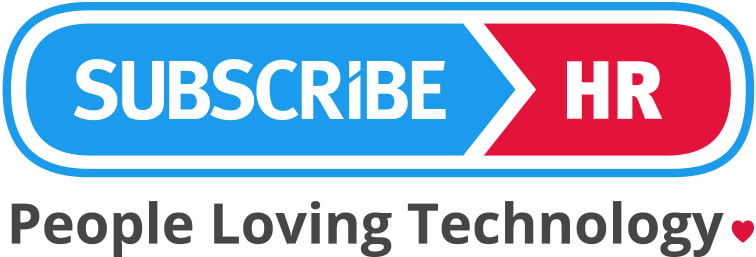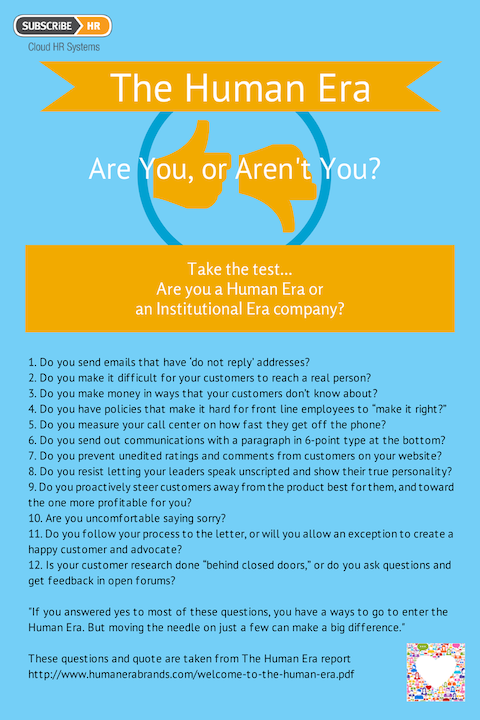In Part one of this Blog, we explored some of the characteristics of Human Era brands as outlined in the report by Hill Holiday and Lippincott. Now let’s dive a little deeper and start thinking about how the role of Human Resources will need to evolve in order to contribute to company, brand and people development in the Human Era.
According to the report, brands that lead in creating and aligning ‘experience’ with ‘story’ produce measurable growth of 4% above and beyond their counterparts in delivering shareholder value. These companies enable employees to become living, breathing examples of the company’s values through providing customers with an experience that actually matches the words on paper. The overall effect - alignment with values creates value!
This alignment between story and experience necessitates the hard work of establishing corporate values that have a customer driven focus and then living them company wide. It almost seems redundant to say this, and to then follow up by saying that Human Resources is at the forefront of embedding these values and processes in the behaviours of all employees. Yet, how many companies do you do business with, even in this day and age, who are actually walking their talk?
Human Resources as a department has been historically maligned for its tendency toward being warm and fuzzy, as opposed to contributing strategic input and measurable dollar value to the bottom line of the business. The focus of HR in The Human Era will need to evolve beyond an ‘either / or’ model of hand holding versus Operational and Administrative functionality, to a more strategic approach that is inclusive of all these factors.
It seems fair to say that The Human Era requires of HR (and HR Professionals) a ‘both / and’ attitude to the embodiment of business functionality and company values. Within Human Resources, it will become even more imperative to provide an authentic living example of, and framework for, Human Era values. These values must then be shared with and lived by all employees within the organisation. If done well, this will then precipitate a flow on effect to customers, community and of course, the bottom line.
If you work in HR, I think it’s fair to say that there is still work to be done in closing the gap between the words and actions of employees at most levels within an organisation. However moving forward, the focus of responsibility for making sure this happens doesn’t rest solely with Human Resources. In the Human Era, everyone needs to have a level of awareness and empowerment around their responsibility to align their words, actions and values with those of the company they choose to work for.
As outlined in the report, several traits appear among the leaders in The Human Era:
- They care intensely about the little things: let’s face it, little things go a long way. The employees of Human Era brands are empowered to do what matters, to do the right thing, to exercise common sense and to practice good old fashioned human kindness. What matters is serving people well and the best brands define a standard of care in actions, not just words. After all, actions really do speak louder than words, and we all know it!
- They are open, real and even flawed: gone are the days where you had to be perfect. Human Era brands take transparency to a new level. Hidden fees and locked in contracts are no longer acceptable ways of doing business. Any good relationship is anchored in candor and honesty. Relationships between Human Era companies, their employees, their customers and the community should be the same.
- They have a deep cultural trait of customer empathy: these brands, including all their employees, feel and understand the pain points of customers and are able to walk in their shoes. This gives them a heightened awareness of how to serve in unexpected, and subsequently very appreciated ways.
- They talk and act like people: communications are eye-to-eye, two-way, reciprocal. Real dialogue, real words and real listening are the keys to good relationships. The same applies for both internal and external relationships across Human Era brands. Paying lip service to these things really is no longer acceptable.
- They aren't boring: Human Era companies can and should have a dynamic personality, just as people do.
- They empower their employees to be the brand: Human Era brands are people versus policy centric and they align personal and company values. There should be no separation of strategy between employer and business. The most successful brands train their people to live their brand through a reciprocal system of trust and personal empowerment.
The Human Era index assesses the extent to which brands exhibit 3 human characteristics and behaviours: authenticity, empathy and vitality. In doing the study, the following questions were asked:
- Do you truly care for and about your customers?
- Are you trustworthy, real and authentic?
- Do you have a personality that is vital and unique?
Other great questions to ask yourself, as outlined in the report, are as follows:
According to The Human Era report, the highest performing brands have outperformed and outdistanced the DOW average by 11% per year for the last 4 years in a row. This implies 50% more value creation after that period.
As profit models shift, balanced measurement approaches will arise, new roles will emerge and the old cliche that marketing is everyone's job will truly take centre stage as a lived experience. It is no longer acceptable that this concept is something that brands just pay lip service to.
As The Human Era report makes abundantly clear ‘To be human in deeds as well as words, a different mindset prevails.’ The role of an organisation is no longer just to make and sell products, but also to engage deeply and openly with clients and customers in creating value together, as collaborators and as partners. Brand purpose and values, as fostered and exemplified both by Human Resources and all employees within an Organisation, will be the same as the ones experienced by customers in their interactions.
‘This mindset can lead to a very different world, a world in which traditional precepts and paradigms are turned on their head,’ declare the writers of The Human Era report.
If the Institutional Era is dead, it is up to Human Resources, as the leaders in shaping the Organisational precepts and paradigms upon which brands are built, to lead the way forward. Human Resources has an opportunity to take the reigns in transforming both themselves and their employees into the fully formed, authentic humans that consumers want them to be. The questions is, how do HR Professionals embed this process as part of company strategy?
As a business, Subscribe-HR is in the business of making the lives of HR Professionals better, happier and more productive. We are also committed to helping HR Professionals put the ‘Human’ back in Human Resources, which to us feels like a very ‘Human Era’ pursuit.
To that end, we would really appreciate it if you could take the survey we’ve put together and give us your feedback regarding the type of content we could provide that would most benefit you as the role of HR Professionals continues to shift and change. We would love to know what else you feel you need to thrive as in The Human Era!
We also encourage you to join the conversation about the future of HR - this really is a collaborative effort! You can do that by subscribing to our Blog on the right, and you can participate in the following ways:
- Follow us and give us feedback - let's get connected on Twitter and LinkedIn:
@SubscribeHR
@HRInTheHumanEra
http://www.linkedin.com/company/subscribe-hr - Join the conversation:
#puttingtheHUMANbackinHR
#HRintheHUMANera
#HRfoodforthought
#thinkoutsidethesquaHR


